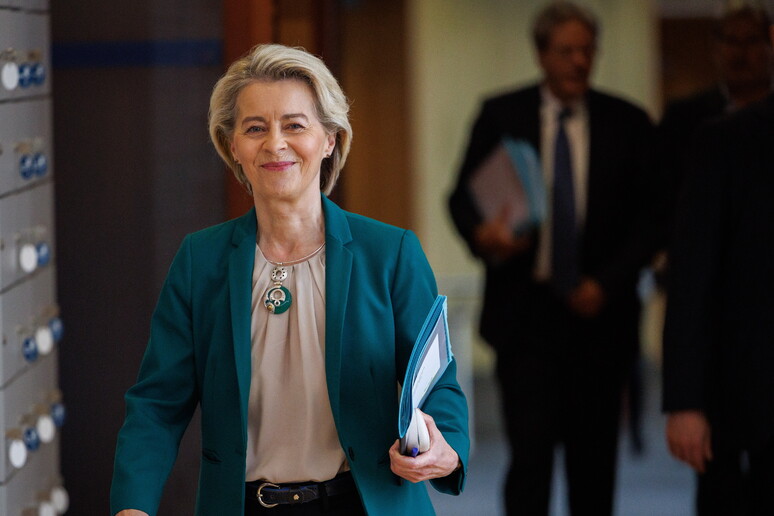Despite expectations for Monday's
informal summit, EU leaders did not seal the deal on who will
take over the bloc's top jobs after the European elections.
Three names are on the table: Ursula von der Leyen, António
Costa and Kaja Kallas. Will they cross the finish line when
leaders meet again next week?
No rerun of 2019.
European Union leaders did not reach a final decision on the
bloc's top jobs at an informal summit in Brussels on Monday,
aimed at agreeing on suitable candidates for the EU's senior
positions after the European elections.
Although the meeting was planned as a first exchange of points
of view on the negotiations, several names came to the table
with the support of a majority of leaders: German conservative
Ursula von der Leyen as European Commission chief, socialist
former Portuguese Prime Minister António Costa as head of the
European Council and liberal current Estonian Prime Minister
Kaja Kallas as High Representative of the EU for Foreign Affairs
and Security Policy.
"We will not have a rerun of 2019, when it was a big tombola,
and everything was up for grabs for three days," said Dutch
Prime Minister Mark Rutte. "That's not the case here. It seems
to be much more clear."
Following the start of the negotiations, the European People's
Party (EPP) also proposed a change to the tradition of two
consecutive two-and-a-half-year terms for the European Council
President role. The idea was to open up the possibility to share
the position between the EPP and another political group, each
serving for one term.
EU leaders will meet again next week to continue the discussions
on the three senior positions. European Council President
Charles Michel emphasised that it is "a collective duty to make
a decision" when leaders return to Brussels.
Gathering support left and right.
The largest pan-EU political bloc - the EPP- was the biggest
winner in the June 6-9 European Parliament elections, cementing
the German conservative von der Leyen's bid for five more years
leading the Commission.
To secure the nod from EU leaders, von der Leyen needs support
from a "qualified majority" of 15 out of 27 countries, covering
at least 65 percent of the bloc's population.
A dozen leaders come from her political grouping, but she also
needed to win over French President Emmanuel Macron from the
centrist Renew Europe group and German Chancellor Olaf Scholz of
the Socialists and Democrats (S&D).
Scholz laid the ground early for von der Leyen's nomination in
an interview on Saturday. "It is clear that after the results of
the elections everything speaks in favour of Ursula von der
Leyen having a second term in office," Scholz said.
Slovenian Prime Minister Robert Golob openly expressed support
for von der Leyen. "Our experience with the president of the
European Commission has been very positive," he said, speaking
of the instrumental role she played in helping Slovenia get
"abundant financial support from Brussels" after the devastating
floods in August 2023.
The second-biggest group in parliament, the Socialists and
Democrats (S&D), had their sights set on the Council position,
with Costa seen as the frontrunner. Despite the cloud hanging
over him since he became embroiled in a corruption probe,
forcing his resignation in November 2023, he continues to be
tipped to succeed the Belgian Charles Michel.
Naming the 47-year-old Kallas - an outspoken Kremlin critic - as
the bloc's foreign affairs chief would send a strong signal to
the EU's east. Ahead of the talks, the bloc's biggest eastern
power, Poland, announced that it was backing Kallas for the
role.
Hungarian Prime Minister Viktor Orbán hit out at the outcome of
Monday's talks as a done deal. "They don't care about reality,
they don't care about the results of the European elections,"
Orbán wrote in a post on social media, "and they don't care
about the will of the European people."
What happens next?.
The 27 EU leaders will meet again to forge an agreement at a
formal summit on June 27 and 28 in Brussels. If, as expected,
von der Leyen ultimately pockets enough leaders' votes, she can
set about choosing her commissioners - drawn from each of the EU
member countries, with consideration for gender balance and
political affiliation.
But she will have one more hurdle to pass: the new European
Parliament has to approve leaders' picks and proposed
commissioners.
Negotiations for the other two posts - with Costa and Kallas in
the spotlight - are also expected to continue at the summit.
A fourth job in play is that of European Parliament president,
which is decided by the legislature, not the leaders. At the
moment, it is likely to return to the incumbent, the EPP's
Roberta Metsola, for another two-and-a-half-year term.
Andrej Plenković, Prime Minister of Croatia, recalled that in
the next few years there is more at stake than these top jobs in
Brussels. "There are also the Secretary General of NATO, the
Secretary General of the Council of Europe, the recently elected
head of the European Investment Bank - and in this whole context
it is necessary to see how the will of the voters is reflected
in the European elections and how the current state of
governments in certain countries is reflected," he said.
(The content is based on news by agencies participating in the
enr, in this case AFP, dpa, EFE, Lusa, STA, Tanjug).
ALL RIGHTS RESERVED © Copyright ANSA











